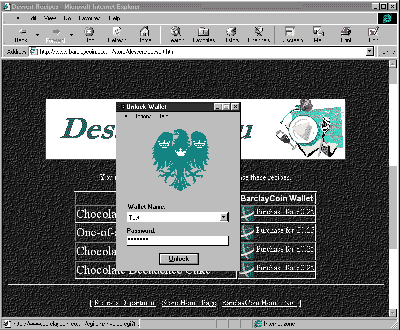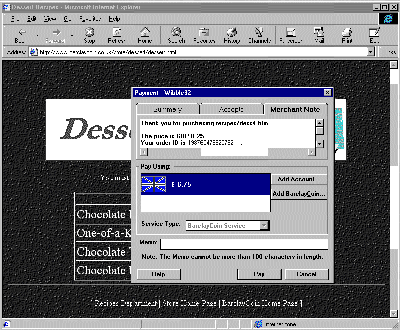We could loose it!
Here we are sitting in the sun with everything being OK in the garden listening to the reports coming through on the radio about Microsoft and the US department of justice. These two giants are currently fighting over whether Microsoft can force the users' choice of browser by making the installation of IE4 a necessary part of Windows 98. This important issue is getting a lot of media coverage at the moment although it seems that some of the real reasons for this battle are being hidden behind the media love of a good scrap. However there is another battle that is going on which concerns not just IT companies but whole continents, this struggle is receiving little or no media coverage. What we are talking about here is the world wide takeover of on-line commerce in all it's forms by American companies. This move is aided and abetted by the US government policies and made easier by the actions of the governments of Europe. If these European governments do not get their acts together then the USA is set to take such a commanding position in electronic commerce that the rest of the world will find it difficult to wrestle free. Don't think that by electronic commerce that we just mean being able to buy a couple of books on line, we are talking about banking, insurance, pensions, credit cards and even payment of utilities. E-Commerce has the potential to reach into every part of our lives and it is a frightening prospect for one country to be in a position to control this.
How is this happening? It may not be a conspiracy, but has come about by one country protecting its information and technology. The other countries are being so slow to respond that the results could be catastrophic. If an out of town supermarket moves in to an area, the local shopkeepers are usually up in arms complaining how trade will be affected. But out of country companies are moving in on Europe and our government is not only not doing anything about it but many of the financial institutions here are making it positively difficult for local companies to compete.
Try to set up a credit card handling web site with real security. Try to get a piece of code that you have written, certificated so that you can distribute it over the web. Try to use any level of encryption over 40 bit. All these are basic things that are needed to 'get going' in E-commerce and are either difficult or impossible to achieve in this country. Why are these things difficult? Our American colleagues have been doing these for some time. After all, Isn't the Internet supposed to break down international barriers and give a level playing field to everyone? Don't you believe it.
The government in this country is only now looking into encryption of data over the net. It has stated that it will " introduce legislation to enable law-enforcement agencies to obtain a warrent for lawful access to information necessary to decrypt the content of communications or stored data". Basically this is having a secure system with a 'back door' available to the government to read encrypted messages. This was proposed some years ago by the US government and came to naught. The department of trade and Industry stated " ...electronic commerce offers tremendous opportunities to us all; but unless we harness those opportunities in policies that are both balanced and internationally compatible then trust and security will be the losers." If our government does not move quickly and help provide a framework by which all forms of E-Commerce can flourish in this country and compete with our American cousins then trust and security will not be the only losers.
Barclaycoin

What do you what to eat today?

The BarclayCoin Wallet

Order details are shown
In a surprisingly low key re-launch of BarclayCoin (www.barclaycoin.co.uk) in April. Barclays have put in place a mechanism that could make a significant contribution to electronic commerce in this country. BarclayCoin allows web sites to charge between 25p and £10 for an item and so offers a type of 'pay per view' service. This opens up all sorts of possibilities for charging for commercial information at low cost that previously would have been difficult to implement. So how does BarclayCoin work? Well, from a user's point of view, they download a small application called a wallet, which is installed on their machine. Obviously the reason that anyone would trust the security of this type of application is because Barclays Bank are putting their name to it. Once installed the user creates one or several accounts, which contain their credit card or switch card details. At any time money can be transferred from one of these accounts to your wallet, usually small amounts of say £10. The money in the wallet is then available to be spent on any BarclayCoin enabled site.
When the user visits these sites they select the item they wish to purchase and the transaction is done there and then with no need to enter endless user details, bliss, sheer bliss. A log is generated in the wallet so that you can keep track of what you have bought. At no time, say BarclayCoin are the credit card details transmitted over the net. All the sites have to use a central BarclayCoin site to handle the money transactions. The system from a users point of view works easily, reliably and is simple to understand, all that you could ask for really. This system of paying is only of use to a site that can deliver low cost items immediately, such as information or software. Conventional credit card transactions would be used for larger value items, and the normal retail type of sites.
So from a users point of view this seems to work. What is involved in a company setting up a BarclayCoin site? We spoke to Nigel Moloney who is the Senior Manager at BarclayCoin for some insight to setting up a BarclayCoin web site. First off,
'what sort of companies will be accepted for BarclayCoin'?
There are no rules for length of trading, turnover etc, Barclays recognise that many of the companies on the web may be start up and have no previous track record.
'What costs are involved?'
BarclayCoin charge only a percentage on each transaction, there are no set-up fees or any other costs involved. True, this commission on each transaction is 25% but the average value of a transaction is low and can be allowed for in the pricing of the items on the web site without deterring customers.
'Is a Credit Card Merchant Agreement needed?'.
No, as this is not a credit card transaction, the only agreement needed is a BarclayCoin one. Once this has been signed and approved, the details on how to configure your web site are sent, and you are away!
'What is the encryption level used? '
56 bit DES 768 RSA is used and no credit card numbers are transmitted over the net.
'If money is put into the wallet, can it be put back to the credit card?'.
Yes this can be done, at the moment it requires a call to BarclayCoin as there is a bar in the software to prevent this, otherwise the wallet could be used as a mechanism to move money between accounts without charges.
'How is the money side handled? '.
BarclayCoin do all the money handling and on an agreed date each month or at an agreed amount to money owing to the site is transferred to a designated bank account.
So with a warm glow in our hearts we decided to sign up and create a site using this technology. By the time you read this, the site (www.ecats.co.uk/barclaycoin) should be up and running, providing news information on direct marketing. All that is needed is to make sure your sever can run Pearl 5 and then to copy some supplied scripts to the cgi-bin and the /site_perl/ directories, these scripts need some modifying which is outlined in the documentation and consists of a total of 6 lines of script that need changing. Then the items to be sold need to be put in another directory with a price information file for each item. This file consists of one line such as gbp 0.25 meaning 25p in UK currency. Finally each item on the web site for sale needs a 'to buy' button with an link to the scripts along the lines of
<a href="cgi-bin/invoice.cgi?file=myfile.htm">
And that is all there is to it. You just sit back and wait for the money to come rolling in....perhaps.
So there we have a truly useful and viable piece of electronic commerce offered by a UK company, perhaps the American strangle-hold on E-commerce is being loosed? Perhaps. Until you realise who Barclays partner is on this project, the company providing the wallet technology is CyberCash of the USA. Q.E.D.